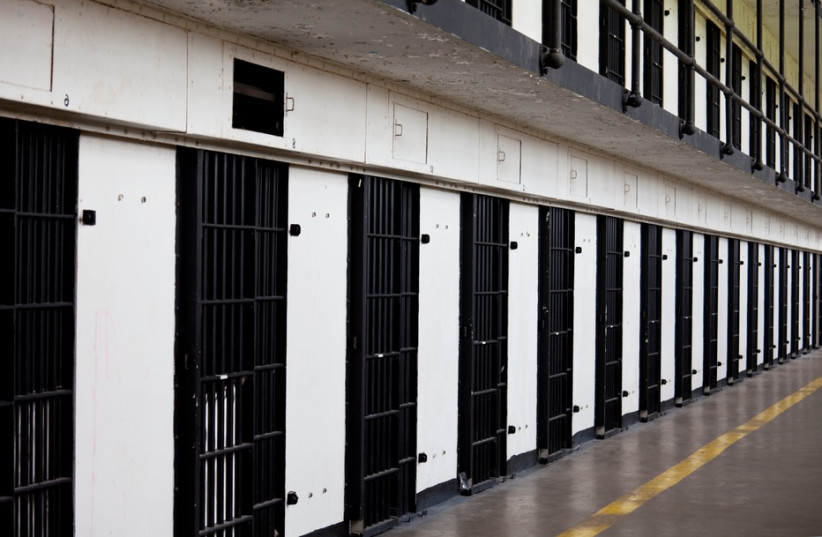The Gaza war has led to overcrowding in the Israel Prison Service (IPS) system to such an extent that it is violating the rights of both Jewish and Arab Israeli prisoners regarding international standard mandated minimum cell space, according to the Public Defender’s Report published on Tuesday.
The violations cause “unprecedented harm” to prisoners’ rights, depicting a “terribly depressing picture” in which prisoners are nowhere near the four-and-half-square-meter minimum afforded to them under international law, the report said.
Prisoners’ rights have been violated in this area for years, with insufficient minimum cell space per prisoner, while consecutive governments made commitments to remedy the situation under orders from the High Court of Justice.
Arguably, the government and the IPS were making extremely slow, yet steady, progress on the issue right up until October 7, when the situation worsened dramatically due to the influx of Palestinian prisoners.
The Public Defender, though, slammed the IPS as being passive and ignoring the issue, even after it became clear that the war would not end within a matter of weeks.
In other words, the Public Defender said the IPS needed to radically reevaluate its policies already by late October or early November to avoid what has happened – a long-term extended violation of prisoners’ rights to minimum space.

Which prisoners are being impacted?
The limited cell space is not only negatively impacting security prisoners, it is harming the rights of violators convicted of much lower-grade, run-of-the-mill nonviolent crimes, the report said.
The report is based on visits to IPS facilities conducted in December.
In response, the IPS said it has been acting under emergency measures since October 7 for both security and common criminal prisoners.
When acting IPS Commissioner Kobi Yaakobi took office on January 24, he requested a prison-wide inmate status report. He also pressed to move forward with government decision 888, which adds new facilities and space, to comply with a High Court ruling on the issue.
Merely adding new facilities would take too long, the report said, adding that the IPS and government must rethink the basic policies guiding the system, such as implementing moves to release low-grade criminals earlier, and to prioritize rehabilitative programs over imprisonment in the first place for some, the report said.
The government and IPS should hold fewer defendants in detention during their trials until they are convicted, it added.
In 2022, Public Defender Anat Meisad Canaan said: “From an objective perspective, the percentage of detentions in Israel is one of the highest; the conditions: demoralizing. Israel still is not meeting the standards for jail-cell space required by the High Court of Justice. We still have not gotten to a situation where every prisoner in Israel has at least three square meters. Those who are most harmed by all of this are the weaker sector clients of society.”
In December 2021, then-justice minister Gideon Sa’ar and then-finance minister Avigdor Liberman disagreed over the correct way to meet those requirements.
At the time, a spokesman for Liberman indicated that the professional levels of the relevant ministries were negotiating over the issue, following an aggressive letter from Sa’ar warning of violating the High Court order.
Since the 2017 ruling, the High Court has pressed the prison system to completely revamp itself, build new facilities, and alter policies to lead to early releases of certain prisoners to meet the minimum international standard.
Although consecutive governments accepted the decision and worked the last few years toward meeting the ruling with some success, large numbers of prisoners still had substantially less space than required even before the current war. The situation is now desperately worse, the report said.
A separate aspect of the report also highlighted the violation of Palestinian security prisoners’ rights in which their mattresses are taken from them, and they sleep on bare bed frames. In one case, Jewish security prisoners’ mattresses were also taken from them, it said.
The IPS later said this was an error with the Jewish prisoners, whereas it had a policy to do so with Palestinian security prisoners.
Palestinian security prisoners were made to eat in darkness some of the time since they were not given electricity between 5 a.m. and 9 p.m., the report said.
All of these issues were flagged as violations, including the differences in treatment between Palestinian and Jewish security prisoners. The IPS said the policy was based on anticipated threat levels, without explaining what that meant, the report said.
